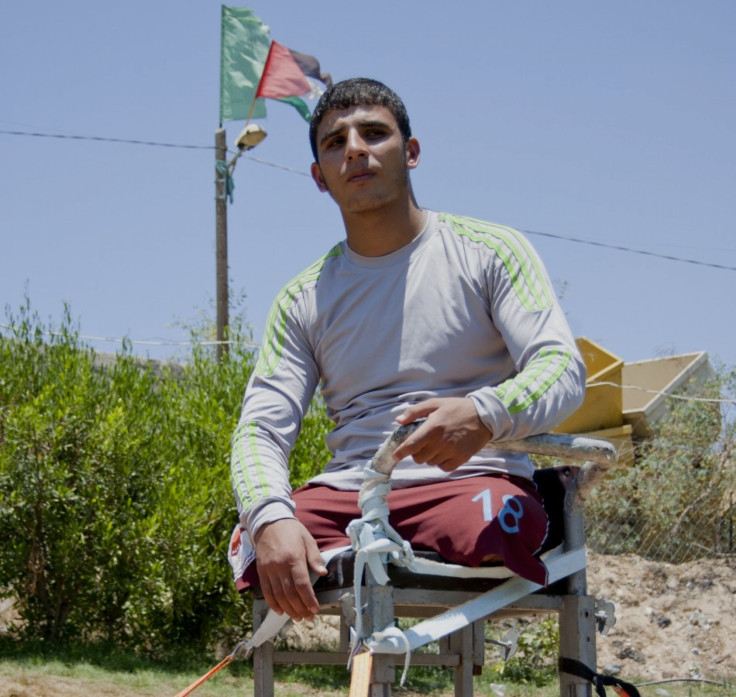Gaza Paralympian Dreams Of Glory While Palestinian Athletes Seek First Medal In London

GAZA CITY, Gaza Strip -- Everybody here calls him The Champion. But Mahmoud Abu Ghanima, a soft-spoken 21-year-old from Gaza, looks away when he's complimented.
Despite his nickname, the Palestinian youth, who is a disabled athlete, will not be competing in London at the end of August, when the Paralympic Games open, following the Olympics set to begin Friday. "I needed nine meters to qualify in the shot put, but did five. I will keep working hard," he said.
That can-do attitude in the face of long odds exemplifies the approach of his fellow Palestinian athletes, whether disabled or not, to the Olympics, where they have competed since 1996. This year, five of them are going. In 2000 and 2004, two Paralympians from the Palestinian territories, which compete as Palestine, even managed to bring medals home, including in the shot put, the specialty where Ghanima hopes to compete one day. That's a remarkable result for an unofficial country split into two parts and without proper facilities to train in.
Every morning, Mahmoud drives through Gaza City to the training field. A minaret overlooks the Al Jazeera Club's fenced patch of lawn, where scores of excited kids run after a soccer ball. The club is the Gaza Strip's only venue for the disabled to practice shot put, discus and javelin throw. "Now I feel good," Mahmoud recalled during his warm up. "I have been coming here regularly for the last three years, but it wasn't so easy in the beginning."
The stumps of his legs wrapped in maroon shorts, he recalled the events that led to his new life as a disabled athlete, four years ago.
"It was April 16, and I was with my family when we heard a huge blast in our neighbors' house. An Israeli drone had just bombed it, he said. I remember waking up the next day with a weird feeling in my legs. The left one was missing, the other was amputated after heavy bleeding. A couple of days after the accident, I dreamt of Prophet Muhammad -- a good sign for Islamic believers. I thank God for the strength he gives me," Mahmoud recalled.
The youngest of nine children of a refugee family, Mahmoud shrugged his broad shoulders when asked about his brother, a shahid, or martyr, as Gazans call those who die for the Palestinian cause. He was killed when explosives he was preparing detonated.
Rockets fired from the strip at the neighboring Israeli cities of Sderot, Ashkelon and Negev desert farms are a constant threat for Israelis. For the Palestinians, so are targeted Israeli air strikes against Islamic Jihad and Hamas militants. Hamas, a radical Islamic party whose charter calls for Israel's disappearance, has ruled the 40-kilometer (25-mile) long coastal enclave since 2007.
But Mahmoud doesn't care about politics. Nor does he like using a wheelchair, crutches or prosthetic legs.
"He is a stubborn kid, and perhaps this has saved him," said Alaa Shatali, secretary general of the Palestinian Paralympic Committee.
Mahmoud's stubbornness may be what helps him survive Gaza's commonplace power cuts and other deprivations. Running water in almost every house comes directly from the sea, while bottled water is used for drinking and cooking.
Few are lucky enough to leave here, either through the northern Erez crossing into Israel or via the southern Rafah crossing into Egypt. Using the smuggling tunnels dug beneath the border with Egypt doesn't take very them far either, without the proper papers allowing traveling farther to Cairo, or Jordan.
As one of those left disabled by the Intifada, as the Palestinians call it, or by the war on terror in Gaza, as Israel views it, he knows that he has little left to look forward to in life other than sports.
Roughly 80 men and women train with the Olympic and Paralympic teams in Gaza, among them sprinter Bahaa Al Farra. He is one of a number of Palestinian athletes who are competing at the London Games by invitation, along with female runner Woroud Sawalha, who competes wearing a veil, and swimmers Ahmed Gebrel and Sabine Haznoun, from the West Bank. Maher Abu Remeleh, a judoka from east Jerusalem, managed to qualify for the Games on his merits.
Both athletes representing Palestine in the Paralympics are from Gaza. Wheelchair-bound Khamis Zakout will be competing in the shot put and javelin throw, and partially-blind Muhammad Fanouna in the 200-meter dash and long jump. Zakout lost his ability to walk in a work accident in Israel, and Fanouna is visually impaired from birth.
Back in Gaza, despite the scorching heat rising off the tar road, Mahmoud deftly made his way to a car, which he drives himself, using only his stocky forearms. Coach Hassan, himself a former disabled athlete, was waiting at the gym for Mahmoud's two-hour body-building session.
The champion must stay strong to perform, and not only on the competition field.
"Everybody's dream here is to win the Games for Palestine one day," Mahmoud said with a smile. But what he really wishes for, he added, is freedom of movement for Gaza's 1.5 million residents and a state, eventually, for the Palestinian people.
© Copyright IBTimes 2025. All rights reserved.





















